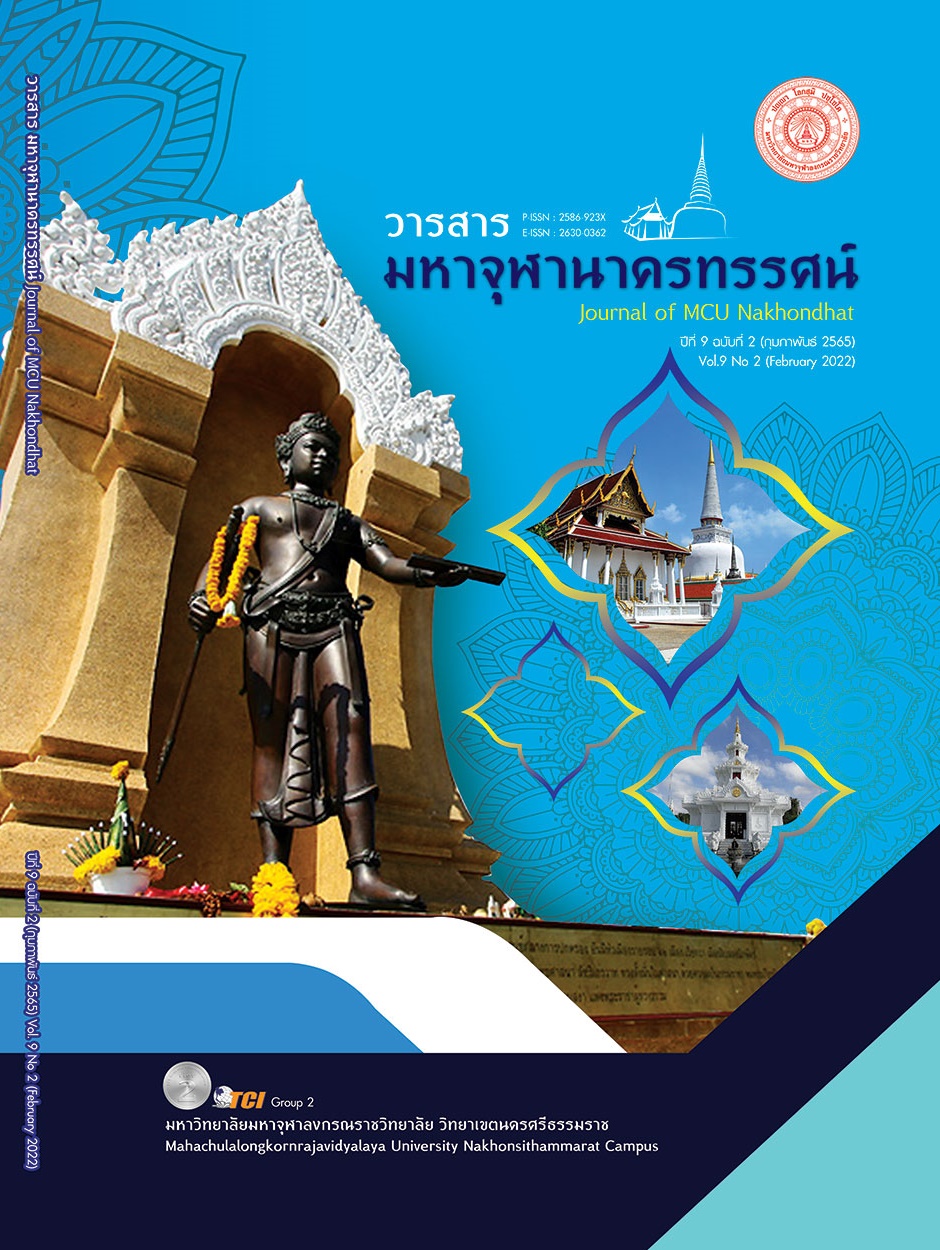LEGAL GUIDELINE FOR REGISTERING OF THE LEGAL STATUS OF SAME-SEX COUPLES
Main Article Content
Abstract
The purposes of this article were to: 1) study concept, Religious theories, customs, traditions, culture and Thai social opinion on registration of legal status of same-sex couples and 2) study and analyze the legal status of same-sex couples in accordance with human rights principles and constitution. This was qualitative research that analyzed data from documents, in-depth interviews by selecting a specific sample group who were 4 groups of representatives involved in the registration of same-sex couples’s legal status: 1) legal, 2) academic, 3) social work, and 4) same-sex couples with totally 45 persons. It was found that 1) according with concept, religious theories, customs, traditions and culture were Christians consider homosexuality a sin, Islam consider forbidden behavior that violates teachings, Hindus consider homosexuality a sin and Buddhism is considered to be against traditions, inappropriate culture but Thai society still sees it as inappropriate behavior. And 2) for guaranteeing and protecting the legal status of same-sex couples is no statutory certification so this makes it not guaranteed and legal protection for cohabiting like heterosexual couples. The problem was not only restrictions on the rights and freedoms of individuals created inequality but also it was discriminated against. It was recommended the legal should be amended to the principles of rights, liberties and equality by regardless of gender differences according to the constitution, B.E. 2560.
Article Details

This work is licensed under a Creative Commons Attribution-NonCommercial-NoDerivatives 4.0 International License.
References
ชลิดาภรณ์ ส่งสัมพันธ์. (2547). จากคอลัมน์หมายเหตุการณ์; สงครามเชิงวัฒนธรรม : การแต่งงานของคนรักเพศเดียวกัน. เนชั่นสุดสัปดาห์, 13(614). (วันที่ 8 – 14 มีนาคม 2547).
ชวินโรจน์ ธีรพัชรพร และภาณุมาศ ขัดเงางาม. (2560). สิทธิความเสมอภาคในการสมรสของบุคคล ที่มีความหลากหลายทางเพศในประเทศไทย. วารสารสมาคมนักวิจัย, 22(2), 24-32.
ณัฐวุฒิ ชัยสายัณห์. (2558). กฎหมายรับรองสถานะในการใช้ชีวิตคู่ร่วมกันของ กลุ่มคนที่มีเพศวิถีแบบรักเพศเดียวกัน. ใน ดุษฎีนิพนธ์นิติศาสตรดุษฎีบัณฑิต สาขาวิชานิติศาสตร์. สถาบันบัณฑิตพัฒนบริหารศาสตร์.
ธัญลักษณ์ นามจักร. (2555). การรับรองสถานภาพการสมรสของบุคคลที่มีความหลากหลายทางเพศ. วารสารนักบริหาร, 33(2), 10-16.
นักบวชในศาสนาพุทธ. (19 กันยายน 2564). แนวทางกฎหมายในการจดทะเบียนรับรองสถานภาพทางกฎหมายของคู่รักเพศเดียวกัน. (ปาลิดา จิรทิพย์, ผู้สัมภาษณ์)
นักวิชาการ. (14 กันยายน 2564). แนวทางกฎหมายในการจดทะเบียนรับรองสถานภาพทางกฎหมายของคู่รักเพศเดียวกัน. (ปาลิดา จิรทิพย์, ผู้สัมภาษณ์)
นักสิทธิมนุษยชน. (14 กันยายน 2564). แนวทางกฎหมายในการจดทะเบียนรับรองสถานภาพทางกฎหมายของคู่รักเพศเดียวกัน. (ปาลิดา จิรทิพย์, ผู้สัมภาษณ์)
บุญชม ศรีสะอาด. (2561). วิธีการทางสถิติสำหรับการวิจัย เล่ม 2. กรุงเทพมหานคร: สุวีริยาการพิมพ์.
บุญอยู่ ขอพรประเสริฐ. (2554). แนวทางการพัฒนามาตรฐานความโปร่งใสของหน่วยงานภาครัฐ. วารสารวิทยาการจัดการ, 28(1), 33-48.
ประชาชนที่เป็นคู่รักเพศเดียวกัน. (19 กันยายน 2564). แนวทางกฎหมายในการจดทะเบียนรับรองสถานภาพทางกฎหมายของคู่รักเพศเดียวกัน. (ปาลิดา จิรทิพย์, ผู้สัมภาษณ์)
ยุทธนา สุวรรณประดิษฐ์. (2543). สิทธิและเสรีภาพของรักร่วมเพศชายตามกฎหมายรัฐธรรมนูญ:วิเคราะห์จากปัญหาสังคมไทย. ใน วิทยานิพนธ์นิติศาสตรมหาบัณฑิต สาขาวิชานิติศาสตร์. จุฬาลงกรณ์มหาวิทยาลัย.
สำนักงานศาลรัฐธรรมนูญ. (2564). รัฐธรรมนูญแห่งราชอาณาจักรไทย พุทธศักราช 2560. (พิมพ์ครั้งที่ 5). กรุงเทพมหานคร: สำนักงานศาลรัฐธรรมนูญ.
สุชาติ ประสิทธิ์รัฐสินธุ์. (2546). ระเบียบวิธีการวิจัยสังคมศาสตร์. (พิมพ์ครั้งที่ 12). กรุงเทพมหานคร: เฟื่องฟ้า ปริ๊นติ้ง.
Cronbach, L. J. (1990). Essentials of psychological testing. (5th ed.). New York: Harper Collins. Publishers.


